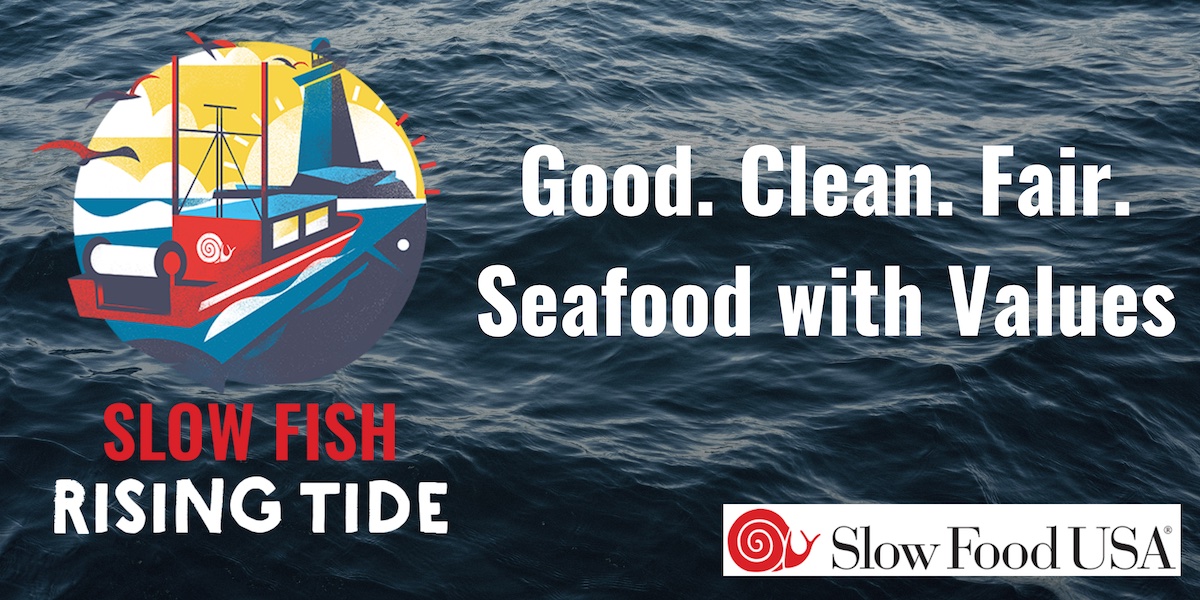Slow Fish Rising Tide Chef Camp
On April 24th Slow Food Philly welcomed 24 chefs and restaurant owners to a Slow Fish Rising Tide Chef Camp hosted at Talula’s Garden restaurant in Philadelphia. The aim: to offer attendees a deep dive into the concept of sustainable seafood and provide some options for sourcing it for their establishments.
Rising Tide events are collaborations between Slow Fish North America, Slow Food USA, and Slow Food chapters in the U.S. and Canada. The goal of these regional gatherings is to bring more people into the conversation about why seafood with values matters.
Organized by Slow Food Philly co-chairs Jennifer Dolan and Karen Stark, and Slow Fish Rising Tide Event Coordinator Ael Leahy, the Philadelphia Chef Camp featured presentations by several sustainable seafood experts. Kicking off the event was Colles Stowell, the founder of the nonprofit One Fish Foundation, whose educational programs aim to boost awareness of where our seafood comes from, how it was harvested or grown, and the benefits of supporting community-based fisheries.
In his information-packed presentation, Stowell threw out some eye-opening statistics about the global fishing industry, including the vast tonnage of bycatch (unwanted species) caught up in nets and then thrown back into the sea to die, the 20 million tons of fish per year that could go to direct human consumption but is instead ground into fish meal (much of it going to feed farmed fish), and the problems of industrial fish farming, which, particularly overseas, relies on ever greater amounts of antibiotics to keep fish in overcrowded pens alive.
Stowell also outlined the One Fish Foundation’s definition of sustainable seafood. “It’s local—it’s about the relationship you have with the fisherman or the oyster grower,” he said. “And it’s abundant, not over harvested—the seafood populations are secure and stable.” Finally, Stowell said, sustainable seafood is good (seasonal, fresh, processed with care), clean (responsibly harvested, preserving of biodiversity); and fair (workers are treated well, harvesters receive a fair price, cultural diversity and traditions are honored).
The group also heard from Steve Kurian, who fishes for salmon in Alaska and began selling his catch directly to people in his Pennsylvania hometown. Twenty years later, Kurian and his wife Jenn now operate Wild for Salmon, which has grown to sell all types of wild seafood, and boasts nationwide shipping and a bricks and mortar store in Bloomsburg, Pa. The company also offers buying club memberships, which provide free shipping of seafood to more than 30 pick-up locations within 100 miles of Bloomsburg. Kurian said he’s been seeing more and more fishermen changing their ways, in terms of how they make their catch and even how they treat fish after they are caught. He’s also seeing more moving to a direct to restaurant or consumer marketing model. “As the restaurants raise their standards, that’s changed things. You really know what quality is.”
Also part of the program was a presentation by Melissa Harabedian of Cape May Salt Oyster Farms, which operates two farms in New Jersey’s Delaware Bay, growing sustainably cultivated premium oysters (available for delivery to homes and restaurants via FedEx). Finally, Feini Yin told the Fishadelphia story. The community-supported fishery, launched in 2018, brings fresh seafood from a locally owned operation in New Jersey, to the People’s Kitchen in South Philadelphia where it is processed. Like a CSA, but with fish instead of vegetables, the seafood is then packed into boxes and delivered to 17 locations in Philadelphia and the surrounding suburbs for Fishadelphia subscribers to pick up. (To ensure that those with lower incomes can access fresh seafood, the organization offers a pay-what-you can sliding scale membership.) “A third-generation clam farmer drives the seafood up from New Jersey every week,” said Yin, who went on to talk about Fishadelphia’s newest effort—to make the organization’s sustainable seafood offerings available to chefs buying for restaurants.
The roster of presentations, which elicited plenty of questions and discussion from the restaurant professionals attending, took a pause mid-day for a spectacular sustainable seafood lunch prepared by the Talula’s Garden team, with restaurant co-owner Aimee Oxley helping out with the serving. The menu included a sliced scallop crudo, Cape May Salt Oyster Farms oyster trio, a hot and sour fish entrée with spring vegetables that included salmon from Wild for Salmon and fluke from Fishadelphia, and for dessert a beautiful fish-shaped waffle served with a sea salt miso caramel sauce and whipped cream.
Closing out the event, the group learned about Slow Food’s community engagement at a national level from Slow Food USA’s Deion Jones and heard a pitch from Slow Food Philly’s co-chairs for ideas for collaborations with restaurants that could help build community connections and provide education about sustainable seafood and the Slow Food concept more generally. 2022 Snail of Approval recipients were awarded a sticker to place in the window of their restaurants. You can learn more about the Snail of Approval recipients here. In a short roundtable discussion that concluded the Chef Camp, attendees raised practical questions about reliably sourcing sustainably fished and harvested seafood when the large seafood distributors they often deal with offer no information about such things.
“Values alignment can be messy, it’s not easy,” acknowledged One Fish Foundation’s Stowell. “It’s a supply chain issue. You need to get as close to the actual producers as possible and continually seek transparency.”
For Ian Moroney, chef/owner of Pumpkin BYOB in Philadelphia, the takeaway from the day was: “The more I know, the more I can make good decisions.”
—Eils Lotozo

